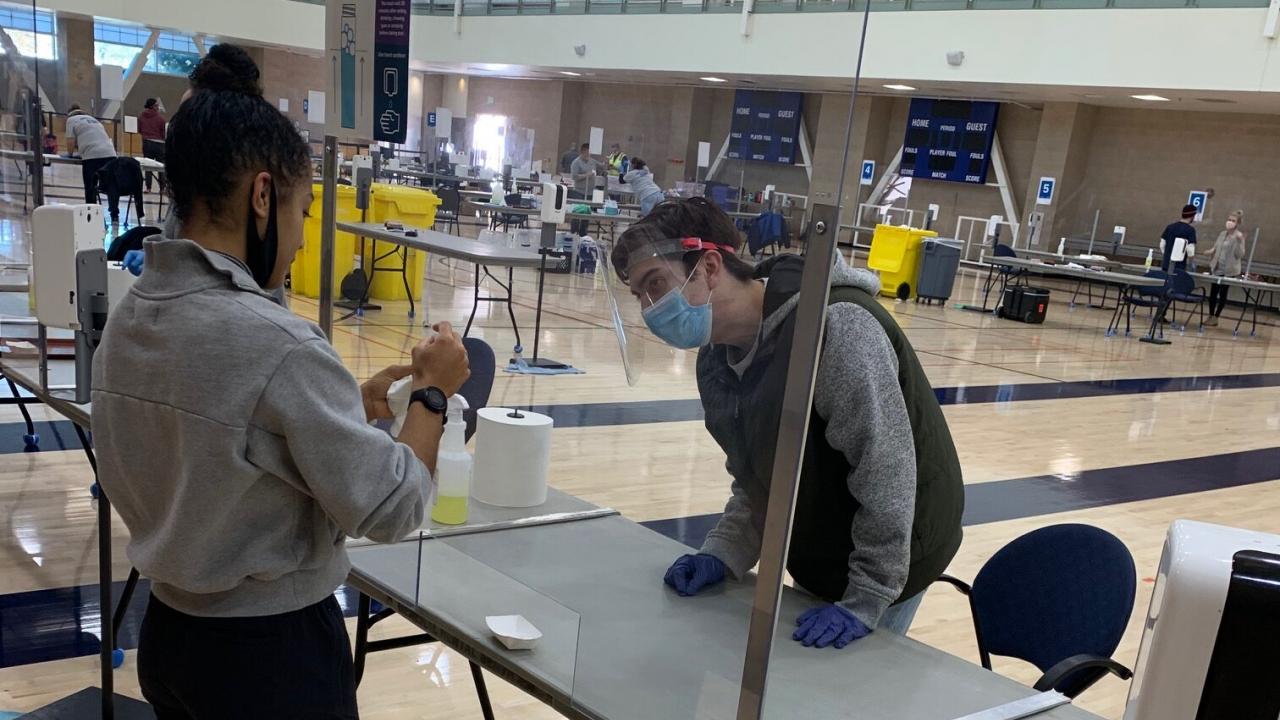
UC Davis Students Conduct Mass Testing for Class
With the need for mass COVID-19 testing on campus, UC Davis offers a course in which students can work at the testing kiosks and learn more about the various aspects of the virus.
The two-credit course, titled “Mass Testing for COVID-19,” or EVE 198, is managed by David Coil and led by Professor Jonathan Eisen in the evolution and ecology department in the College of Biological Sciences.
“This course was designed to ‘make lemonade out of lemons’ with the pandemic,” Coil said. “This helps staff the testing kiosk and gives many students a great CV item and first exposure to a healthcare-adjacent setting.”
Students enrolled in the class are required to work three hours per week at the UC Davis Testing Kiosk. There, they must wear personal protective equipment and do various tasks, such as answering questions, checking people in, controlling the crowd and prepping supplies.
The students are not involved directly in collecting samples and are instead instructed to prioritize safety.
Students may also request alternative options if they cannot do the kiosk activities.
At the end of the quarter, they will write a short essay on their experience.
The class also holds weekly “town-hall style” guest lectures over Zoom, when experts in the field from around the country are brought in to speak. So far, there have been discussions on lab methods, ethics, social inequities, coronavirus studies, the UC Davis system and more.
Genetics and genomics major and EVE 198 student Matthew Philipps says that what he looks forward to most is the human interaction at the kiosks and the stimulating conversations held during the Town Hall meetings.
“There is in me a sense of pride and enjoyment that I’m doing something in general to help out in the pandemic effort,” Philipps said.
One challenge Philipps has faced while working is regarding cleanliness and sanitization as well as giving directions. Some individuals will eat, drink, chew gum or smoke within a half-hour of their appointment, which can contaminate the test and lead to an inconclusive result.
“The number-one situation we are trying to avoid at the kiosk (obviously beyond the continued spread of SARS-CoV-2) is a waste of people’s time, which an inconclusive test result ultimately leads to,” he added.
First-year student and neurobiology, physiology and behavior major Lindsey Nguyen says she first got interested in enrolling in the course after watching the docuseries “Regular Heroes” on Amazon Prime. The series focuses on how different people in various careers, such as teachers and waste collectors, can help out during the pandemic.
“It’s very interesting being able to work at the kiosk because you see a lot of problems that need to be resolved,” Nguyen said.
Nguyen observed that most of the staff make only around minimum wage and are unable to afford lunch during their full shifts. To help out, she would often go to the dining commons to bring them some fruit or coffee.
“My favorite thing is meeting the people and getting to know new people. After quarantine and not talking to anyone besides my family, I think getting to be out in the real world again was very nice.”
The testing kiosk began operation on Sept. 14 while the course began at the start of the quarter on Sep. 30. Students, however, did not start working for another week to give them time for training.
There are roughly 65 students enrolled in the course.
“It’s been a successful experience I would say,” Coil said.
As time has passed, the kiosk has begun to test more and more people. Coil estimates they test about 1,500 people per day but predicts that it will be closer to 3,000 soon. Their near-term target is 20,000 samples per week.
The asymptomatic testing has included students who live on campus or in sororities and fraternities off campus, as well as employees of Student Housing and Dining Services, Student Health and Counseling Services, Occupational Health Services, and the campus police and fire departments. According to the testing dashboard, there have been 21 asymptomatic positive results.
The testing kiosk was initially held at the Pavilion parking structure but has since been moved to the Activities and Recreation Center since that space has been found to be large enough to accommodate 10,000 people coming through each week and has adequate ventilation to mitigate potential viral risks related to airflow.
Nasal swab testing has also been switched to saliva-based testing after being validated through the UC Davis Health procedures.
Saliva-based testing uses a quantitative polymerase chain reaction process, borrowed from the agricultural genetics industry, to detect whether someone is actively infected with COVID-19 even if they show no symptoms.
Besides the students enrolled in the course, the testing kiosk is run by 56 staff members and several volunteers. Most of the staff members have been temporarily reassigned from their positions, including those from the Western Institute for Food Safety and Security, Student Housing and Dining Services and the One Health Institute.
UC Davis is also expanding its program to the city of Davis through Healthy Davis Together to prevent the spread of the virus while facilitating a gradual return to regular city activities and bringing UC Davis students back into the Davis community.
“It's been amazing to watch the entire campus come together with everyone outside their comfort zone and working at a breakneck pace to make this all happen,” Coil said.
The course will be offered again next quarter.
Media Resources
- This story was originally posted by the the Davis Enterprise
